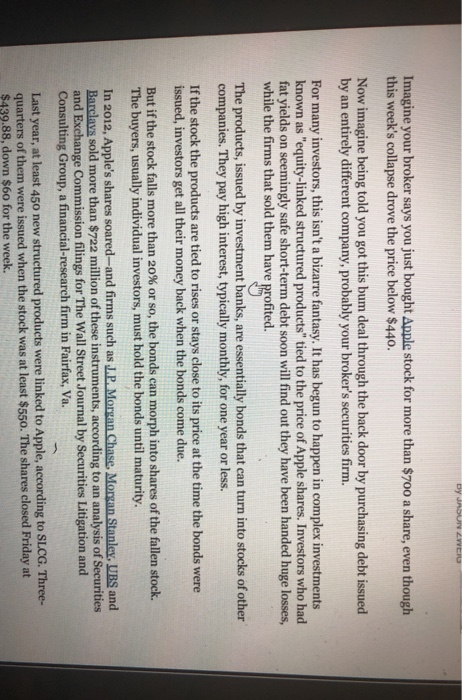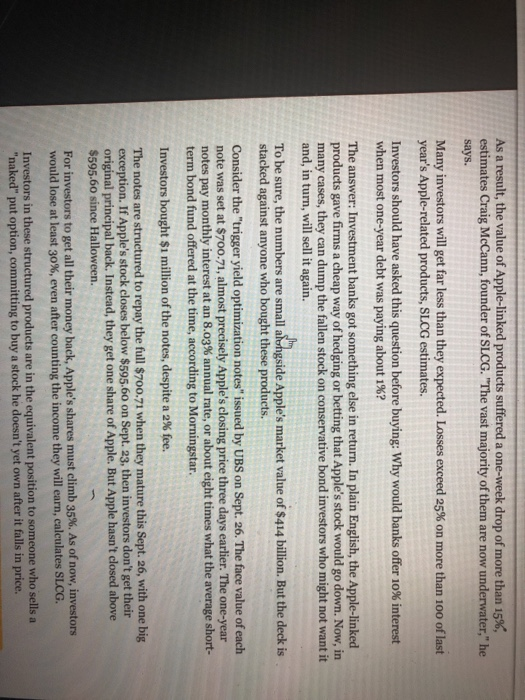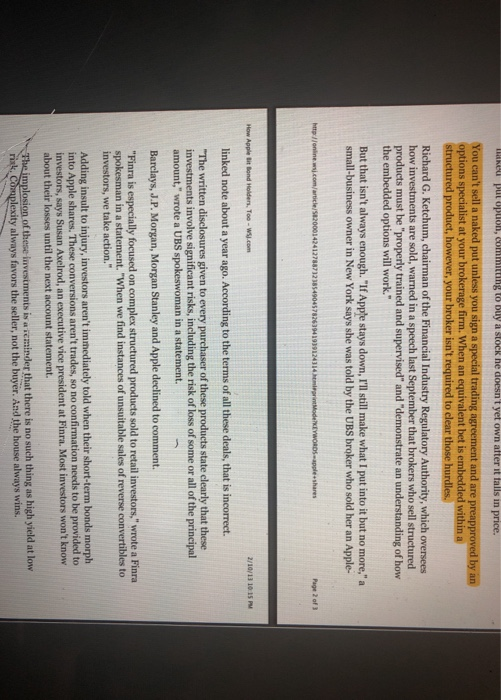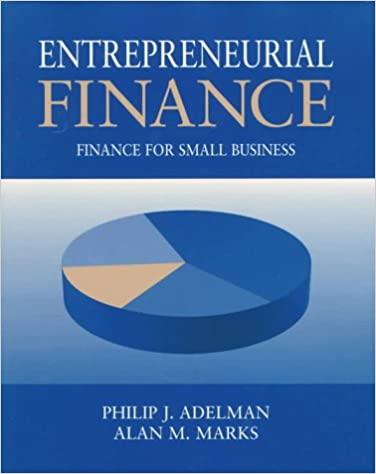based on this article identify key similarities between the investment product described in the article and corn accumulator contracts used by farmer.

by JADUN ZWEIG Imagine your broker says you just bought Apple stock for more than $700 a share, even though this week's collapse drove the price below $440. Now imagine being told you got this bum deal through the back door by purchasing debt issued by an entirely different company, probably your broker's securities firm. For many investors, this isn't a bizarre fantasy. It has begun to happen in complex investments known as "equity-linked structured products" tied to the price of Apple shares. Investors who had fat yields on seemingly safe short-term debt soon will find out they have been handed huge losses, while the firms that sold them have profited. The products, issued by investment banks, are essentially bonds that can turn into stocks of other companies. They pay high interest, typically monthly, for one year or less. If the stock the products are tied to rises or stays close to its price at the time the bonds were issued, investors get all their money back when the bonds come due. But if the stock falls more than 20% or so, the bonds can morph into shares of the fallen stock. The buyers, usually individual investors, must hold the bonds until maturity. In 2012, Apple's shares soared-and firms such as J.P. Morgan Chase, Morgan Stanley, UBS and Barclays sold more than $722 million of these instruments, according to an analysis of Securities and Exchange Commission filings for The Wall Street Journal by Securities Litigation and Consulting Group, a financial-research firm in Fairfax, Va. Last year, at least 450 new structured products were linked to Apple, according to SLCG. Three- quarters of them were issued when the stock was at least $550. The shares closed Friday at $439.88, down $60 for the week. As a result, the value of Apple-linked products suffered a one-week drop of more than 15%, estimates Craig McCann, founder of SLCG. "The vast majority of them are now underwater," he says. Many investors will get far less than they expected. Losses exceed 25% on more than 100 of last year's Apple-related products, SLCG estimates. Investors should have asked this question before buying: Why would banks offer 10% interest when most one-year debt was paying about 1%? The answer: Investment banks got something else in return. In plain English, the Apple-linked products gave firms a cheap way of hedging or betting that Apple's stock would go down. Now, in many cases, they can dump the fallen stock on conservative bond investors who might not want it and, in turn, will sell it again. To be sure, the numbers are small alohgside Apple's market value of $414 billion. But the deck is stacked against anyone who bought these products. Consider the "trigger yield optimization notes" issued by UBS on Sept. 26. The face value of each note was set at $700.71, almost precisely Apple's closing price three days earlier. The one-year notes pay monthly interest at an 8.03% annual rate, or about eight times what the average short- term bond fund offered at the time, according to Morningstar. Investors bought $1 million of the notes, despite a 2% fee. The notes are structured to repay the full $700.71 when they mature this Sept. 26, with one big exception. If Apple's stock closes below $595.60 on Sept. 23, then investors don't get their original principal back. Instead, they get one share of Apple. But Apple hasn't closed above $595.60 since Halloween. For investors to get all their money back, Apple's shares must climb 35%. As of now, investors would lose at least 30%, even after counting the income they will earn, calculates SLCG Investors in these structured products are in the equivalent position to someone who sells a "naked" put option, committing to buy a stock he doesn't yet own after it falls in price. e put option, committing to buy a stock he doesn't yet own after it falls in price. You can't sell a naked put unless you sign a special trading agreement and are preapproved by an options specialist at your brokerage firm. When an equivalent bet is embedded within a structured product, however, your broker isn't required to clear those hurdles Richard G. Ketchum, chairman of the Financial Industry Regulatory Authority, which oversees how investments are sold, warned in a speech last September that brokers who sell structured products must be "properly trained and supervised" and "demonstrate an understanding of how the embedded options will work." But that isn't always enough. "If Apple stays down, I'll still make what I put into it but no more," a small-business owner in New York says she was told by the UBS broker who sold her an Apple- http://onlinews.com/article/582000 Page 2 of How Apple iBond Holders. Toe - WS.com 2/10/13 10:15 PM linked note about a year ago. According to the terms of all these deals, that is incorrect. "The written disclosures given to every purchaser of these products state clearly that these investments involve significant risks, including the risk of loss of some or all of the principal amount," wrote a UBS spokeswoman in a statement. Barclays, J.P. Morgan, Morgan Stanley and Apple declined to comment. "Finra is especially focused on complex structured products sold to retail investors," wrote a Finra spokesman in a statement. "When we find instances of unsuitable sales of reverse convertibles to investors, we take action." Adding insult to injury, investors aren't immediately told when their short-term bonds morph into Apple shares. These conversions aren't trades, so no confirmation needs to be provided to investors, says Susan Axelrod, an executive vice president at Finra. Most investors won't know about their losses until the next account statement. The implosion of these investments is a reminder that there is no such thing as high yield at low risk, Complexity always favors the seller, not the buyer. And the house always wins. by JADUN ZWEIG Imagine your broker says you just bought Apple stock for more than $700 a share, even though this week's collapse drove the price below $440. Now imagine being told you got this bum deal through the back door by purchasing debt issued by an entirely different company, probably your broker's securities firm. For many investors, this isn't a bizarre fantasy. It has begun to happen in complex investments known as "equity-linked structured products" tied to the price of Apple shares. Investors who had fat yields on seemingly safe short-term debt soon will find out they have been handed huge losses, while the firms that sold them have profited. The products, issued by investment banks, are essentially bonds that can turn into stocks of other companies. They pay high interest, typically monthly, for one year or less. If the stock the products are tied to rises or stays close to its price at the time the bonds were issued, investors get all their money back when the bonds come due. But if the stock falls more than 20% or so, the bonds can morph into shares of the fallen stock. The buyers, usually individual investors, must hold the bonds until maturity. In 2012, Apple's shares soared-and firms such as J.P. Morgan Chase, Morgan Stanley, UBS and Barclays sold more than $722 million of these instruments, according to an analysis of Securities and Exchange Commission filings for The Wall Street Journal by Securities Litigation and Consulting Group, a financial-research firm in Fairfax, Va. Last year, at least 450 new structured products were linked to Apple, according to SLCG. Three- quarters of them were issued when the stock was at least $550. The shares closed Friday at $439.88, down $60 for the week. As a result, the value of Apple-linked products suffered a one-week drop of more than 15%, estimates Craig McCann, founder of SLCG. "The vast majority of them are now underwater," he says. Many investors will get far less than they expected. Losses exceed 25% on more than 100 of last year's Apple-related products, SLCG estimates. Investors should have asked this question before buying: Why would banks offer 10% interest when most one-year debt was paying about 1%? The answer: Investment banks got something else in return. In plain English, the Apple-linked products gave firms a cheap way of hedging or betting that Apple's stock would go down. Now, in many cases, they can dump the fallen stock on conservative bond investors who might not want it and, in turn, will sell it again. To be sure, the numbers are small alohgside Apple's market value of $414 billion. But the deck is stacked against anyone who bought these products. Consider the "trigger yield optimization notes" issued by UBS on Sept. 26. The face value of each note was set at $700.71, almost precisely Apple's closing price three days earlier. The one-year notes pay monthly interest at an 8.03% annual rate, or about eight times what the average short- term bond fund offered at the time, according to Morningstar. Investors bought $1 million of the notes, despite a 2% fee. The notes are structured to repay the full $700.71 when they mature this Sept. 26, with one big exception. If Apple's stock closes below $595.60 on Sept. 23, then investors don't get their original principal back. Instead, they get one share of Apple. But Apple hasn't closed above $595.60 since Halloween. For investors to get all their money back, Apple's shares must climb 35%. As of now, investors would lose at least 30%, even after counting the income they will earn, calculates SLCG Investors in these structured products are in the equivalent position to someone who sells a "naked" put option, committing to buy a stock he doesn't yet own after it falls in price. e put option, committing to buy a stock he doesn't yet own after it falls in price. You can't sell a naked put unless you sign a special trading agreement and are preapproved by an options specialist at your brokerage firm. When an equivalent bet is embedded within a structured product, however, your broker isn't required to clear those hurdles Richard G. Ketchum, chairman of the Financial Industry Regulatory Authority, which oversees how investments are sold, warned in a speech last September that brokers who sell structured products must be "properly trained and supervised" and "demonstrate an understanding of how the embedded options will work." But that isn't always enough. "If Apple stays down, I'll still make what I put into it but no more," a small-business owner in New York says she was told by the UBS broker who sold her an Apple- http://onlinews.com/article/582000 Page 2 of How Apple iBond Holders. Toe - WS.com 2/10/13 10:15 PM linked note about a year ago. According to the terms of all these deals, that is incorrect. "The written disclosures given to every purchaser of these products state clearly that these investments involve significant risks, including the risk of loss of some or all of the principal amount," wrote a UBS spokeswoman in a statement. Barclays, J.P. Morgan, Morgan Stanley and Apple declined to comment. "Finra is especially focused on complex structured products sold to retail investors," wrote a Finra spokesman in a statement. "When we find instances of unsuitable sales of reverse convertibles to investors, we take action." Adding insult to injury, investors aren't immediately told when their short-term bonds morph into Apple shares. These conversions aren't trades, so no confirmation needs to be provided to investors, says Susan Axelrod, an executive vice president at Finra. Most investors won't know about their losses until the next account statement. The implosion of these investments is a reminder that there is no such thing as high yield at low risk, Complexity always favors the seller, not the buyer. And the house always wins










